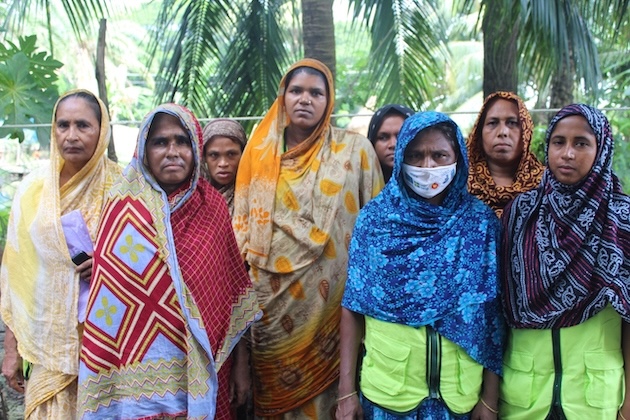Profits and Empowerment Through Climate-Resilient Farming
Cooperative Farming Makes Bangladesh’s Coastal Women Farmers Climate-Resilient
January 13, 2024

Bangladeshi women cooperative farmers underwent training and support on climate-tolerant agricultural practices, which helped them cope with the adverse consequences of extreme weather events in the coastal regions.
By Rafiqul Islam.
In the past, Salma Begum, 40, lost her crops every year due to natural disasters. She lives with her five-member family in Ashabaria village under Rangabali upazila, a remote coastal island in Patuakhali district.
“We did not have enough livelihood options in the coastal area where we live. Cyclones, coastal floods, and tidal surges have been having adverse impacts on agriculture, making it difficult for my wage-laborer husband to find work regularly,” she said.
“We have no arable land either,” said Salma, a mother of three.
Now, the Local Government Initiative on Climate Change (LoGIC) project, jointly implemented by the Bangladesh government and UNDP for delivering adaptation benefits to vulnerable coastal people, has ushered in a ray of hope for Salma and many others since they got training on climate-tolerant livelihood practices.
After the training, eight women of Ashabaria village, including Salma, formed a group, and each member of the group received Taka 30,000 (USD 273) from the project’s Climate Resilient Fund (CRF) through their bank accounts. Later, they deposited the money in a group bank account.
“With the money we received from the CRF, we first leased arable land from a local landlord at Taka, which cost us one lakh (USD 910), and we started climate-resilient agriculture under cooperatives last year,” said Salma, who is also the group leader.
She said they sowed mug dal, also known as mung bean, and paddy on the agricultural land.
“Because torrential rain damaged our paddy field just before harvesting the food grain, we were unable to make a profit from cultivating that paddy last year. But this year we earned a profit of Taka 20,000 (US$ 180) by sowing mug dal. We got Taka 2,500 each from the profit.”
Shahnaj Akter, another member, said that before starting a new venture, they sit together and take any decisions in consultation with each other.
“We work together on the crop field too. During the mug dal cultivation, we ourselves sowed and harvested the cash crop. And even we ourselves processed mug dal before selling it,” she said.
Shahnaj said they also received training on sheep and duck farming and vegetable cultivation. Now she spends several hours a day at her homestead, where she has built a duck farm and is cultivating vegetables.
“Now I have 20 ducks at my farm. I get eggs every day and sell them. I get meat too from my duck farm. So, I am now supporting my family financially by selling vegetables and eggs,” she said.
“In the past, we led a miserable life as we did not have enough income. Now, after starting agriculture under cooperatives, we are now able to support my family,” said Rabeya Begum, a mother of five.
Building Climate Resilience
Led by the Local Government Division of the Ministry of Local Government Rural Development and Cooperatives, the LoGIC project is providing the Community Resilience Fund (CRF), aiming to help the most climate-vulnerable women build resilience to climate change by enabling them to take climate-adaptive livelihoods.
Through this CRF support, the women apply community-based approaches to invest in climate-adaptive livelihoods like sunflower production, climate-tolerant rice, dal and watermelon cultivation, and more.
Maksudur Rahman, the project’s community mobilization facilitator, said the climate-vulnerable coastal women developed business plans together and accordingly leased arable lands from landowners within their surrounding neighborhood. Later, they prepared the land for cultivating climate-tolerant crop varieties.
“We provide technical support for them. The LoGIC project also facilitates market linkages and networking support for women farmers so that they can sell their agricultural products,” he said.
Project coordinator AKM Azad Rahman said about 2,013 groups of women farmers have so far been formed under the project in the climate-vulnerable regions of Bangladesh, supporting around 35,000 women through the CRF scheme.
Extreme Weather Hits Coastal Agriculture Hard
Bangladesh is one of the most vulnerable countries to climate change, while cyclonic storms, flooding, and storm surges severely affect agriculture in the country’s coastal area every year. Once a natural disaster hits the coastal region of Bangladesh, it damages a huge area of crop fields, putting local farmers in peril.
According to an estimate from the Department of Agricultural Extension (DAE), Bangladesh incurred crop loss worth Taka two billion due to the recent cyclone Midhili that lashed the country’s coast.
The cyclone damaged 432.6 hectares of Aman paddy, and pea, mustard, Boro paddy seed beds, betel, and lentils were affected too.
Mahmud Hasan, chairman of Maudubi Union Parishad at Rangabali, said climate change is severely affecting agriculture in the country’s coastal area.
He said there is plenty of rainwater during the monsoon but a scarcity of water during the dry season.
“Pulse and watermelon cultivation faces setbacks during the dry season for lack of freshwater as the groundwater level drops drastically at that time,” he said.
Farmer Saifuddin Mito said they had to sow Aman paddy twice this year as their paddy seedbeds were damaged earlier due to excessive rainfall, resulting in an increase in the cost of crop production.
Join the movement towards climate-resilient agriculture in coastal Bangladesh. Discover how Salma Begum and her fellow women farmers are transforming their lives through the Local Government Initiative on Climate Change (LoGIC) project. Learn how community-based approaches, training, and financial support are making a significant difference in building climate resilience. Support the efforts to combat climate change and empower women in vulnerable communities today!
Related
content
content

 Locations
Locations



